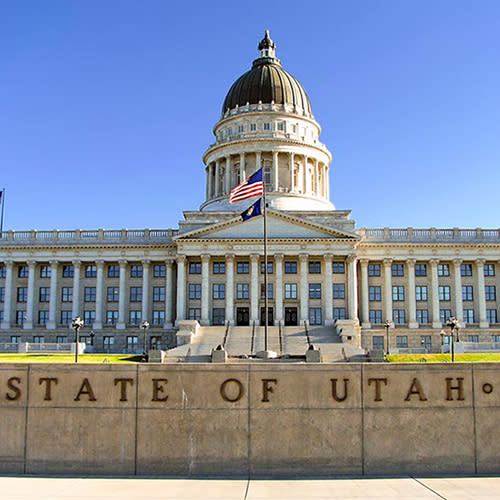Sophia Hawes-Tingey

Legislative Happenings - 02/10/18
Business Bills from Worker's Comp to Limited Liability Companies
We are officially halfway through the 2018 Utah State Legislative Session. This week, I read through another six bills as they came up before committee meetings, which brings the total number of bills I am now tracking to 47. On Monday, the Senate and House Committees on Business and Labor have scheduled about 17 bills total between them, with one committee meeting at 8 in the morning, and the other in the afternoon. This week I attended the shortest committee meeting on Wednesday, which lasted 17 minutes, and the longest committee meeting on Thursday that lasted over three hours. I met and talked with the two conservative sponsors of SB86 (Victim Targeting Penalty Enhancements) and SB138 (Gender Marker Change Amendments). Senator Dan Thatcher, who is sponsoring SB86, expressed his concern that Senators are telling him that they don't know how to vote since the LDS Church hasn't weighed in yet. According to Troy Williams of Equality Utah, Senate President Neiderhauser has also said that the bill won't be heard. Senator Todd Weiler, who is sponsoring SB138, is contemplating an amendment to his bill that would require hormone therapy like the law in Oregon. When he asked me what I thought of that amendment, I suggested that if he really had to amend the bill in that direction, he should expand it using the term "medically transitioned," defined as either "being on cross-sex hormone therapy or having had any surgery to align someone's body with their target sex." The last thing we want is a requirement for surgery to be able to change your gender marker. One of his trans constituents has asked him to return to the judges for their input.
This week, I want to focus on bills that may impact business, particularly small businesses. To that end, I selected ten bills to review that I have not yet covered. In this collection, there is one bill on worker's compensation, one on electric energy, one dealing with construction codes, five with occupational and professional licensing, one on the transportation network, and one on limited liability companies. Some of these descriptions are fairly brief, and others I'll be elucidate a bit more.
Worker's Compensation
- SB64 (Worker's Compensation Health Care Amendments, sponsored by Senator Karen Mayne). This bill fixes the non-contractual rate at which a worker's compensation healthcare provider or a self-insured provider must reimburse a hospital at 85% for worker's compensation claims. This requirement went into effect on May 10, 2016 and is currently scheduled to expire on July 1 of this year. This was originally done as a trial period to ensure that the rate of coverage was a reasonable amount and not too burdensome. There was some discussion to amend the bill to change the amount from 85%, but that amendment was rejected. If this bill passes, the rate of reimbursement becomes permanent. SB64 is still making it's way through the Senate.
Electric Energy
- SB141 (Electric Energy Amendments, sponsored by Senator Curtis Bramble). When I went into the committee meeting, I expected a lengthy debate. This bill didn't get one because it was a result of a compromise between solar energy providers and energy utility companies. In exchange for extending solar installation tax credits by two years, it repeals the Net Metering Act in 2036. Net metering is a billing system in which a residence or business that creates surplus energy during one part of the day gets paid energy credits to be drawn on for any energy later used from the grid. Because energy generation for locations with solar panels peaks during daylight hours, and is consumed during evening hours, the excess energy is pushed to the grid during peak production hours, and effectively returned during consumption hours. The argument has generally been about the rate credited, with solar customers expecting full retail rates, and utility companies wanting some form of reimbursement for the use of the electrical grid. Battery technology in the future for home and business solar installations may make this issue mute. This bill gives 18 years for technology to catch up or for customers to come to an agreement with utility companies. SB141 is still in the Senate.
Construction Code
- HB32 (Uniform Construction Code Amendments, sponsored by Representative Mike Schultz). This is what's known as a "clean-up bill." Federal and international construction code regulations are mimicked in the Utah Code. I'm assuming this is because state construction code probably existed before federal and international code guidelines came into place and were subsequently adopted. This year, one of the changes is the definition of "Motor Vehicle Waste Disposal Well," because too many people kept asking what an injection well was. It is essentially a runoff for motor vehicle fluids and is restricted in the state of Utah. The changes to the International Residential Code with regards to plumbing fixture shutoff valves and un-grounded conductors and the National Electrical Code with regards to three-phase receptacles. This bill is still in the House.
Occupational and Professional Licensing
- HB37 (Occupational and Professional Licensing Amendments, sponsored by Representative James A. Dunnigan). HB37 applies uniformity to background checks and penalty collections for various licenses. It also removes the requirement that the member of the Nurse Licensing Board appointed the Division of Occupational and Professional Licensing (DOPL) be a master's level nurse. This particular change drew criticism from the Utah Nursing Association, who felt that the full board should be comprised of nurses. The counterargument is that each licensing board needs to make sure that they have at least one non-licensed member so that the licensing doesn't become overly protective and restrictive of entry into that respective profession, per recent judicial decisions. This bill also expands the Wildlife and Gaming Commission from three members to five, and has made it through both houses and awaiting the governor's signature.
- HB63 (Cosmetology and Associated Professions Amendments, sponsored by Representative Karen Kwan). HB63 allows cosmetologists and other professionals to take the federal licensing exams in languages other than English. As an example, nail technologists from Korea quite frequently leave Utah to go to California or other states where they are allowed to take and pass the federal licensing exam in their native language before they return to Utah to work. This bill allows them to not have to make that trip just to get licensed. HB63 has passed out of the House and is currently in the Senate.
- HB170 (Licensing Fees Waivers Amendments, sponsored by Representative Susan Pulsipher). If a military member holding a professional is actively deployed, they can have their license put on hold so it doesn't expire. Having passed through the House, and now in the Senate, this bill would also waive the renewal licensing fees for that member.
- HB173 (Occupational Licensing Requirement Amendment, sponsored by Representative A. Cory Maloy). If a person received a license in another state whose requirements were equal to or more stringent than the requirements for the equivalent license in Utah, the licensee would not be required to go through the process of meeting those same requirements in Utah if this bill passes. In it's current form, it requires having worked for at least a year under their current license in the other state before paying a fee and obtaining the equivalent license Utah. Those opposing this bill point would like to see it require residency in Utah and have the requirement be only a single year for all licenses. HB173 is still in the House, trying to get through committee.
- HB192 (Professional Licensing Boards Amendments, sponsored by Representative R. Curt Webb). Currently, it is illegal for professional licensing boards to testify and make recommendations on legislation concerning the licensing process. Representative Webb's bill would reverse that decision allowing them to have a voice to help being to light anything that may make the licensing process better. HB192 still has yet to make it out of the House as well.
Transportation Network
- HB47 (Transportation Network Vehicle Recovery Fund Sunset). Transportation networks in this case refer to networks like Uber and Lyft, which use personally owned vehicles for transportation services. In 2016, the legislature passed a bill requiring each network to pay $15,000 in one-time charges, and charge ten cents per ride to go into a quasi-insurance fund to be managed by the state. This was to cover instances in which if a vehicle was damaged while waiting for a ride, a claim could be made to the state, and if there was money in this fund, the state could pay out against that claim. This particular bill changes the law to no longer take money from the transportation networks at all, and therefore the fund will eventually expire when the balance reaches zero. HB47 has passed both houses and is waiting for the governor's signature.
Limited Liability Companies
- HB186 (Limited Liability Company Amendments, sponsored by Representative Kevin J. Stratton). This bill, which has made it out of the House and into the Senate, allows a Limited Liability Company (LLC) like People Empowered, LLC, to declare themselves a Benefit LLC (or BLLC). Just a couple of years ago, in response to company executives being sued for Corporate Social Responsibility because they weren't maximizing profits, the state created the capability for corporations to declare themselves as benefit corporations to protect themselves for being good corporate citizens and stewards. Part of the contract of being a benefit corporation is the requirement of declaring what social or environmental benefits the company provides. With an increasing population more sensitive to the needs of companies that contribute back to society and the environment, consumers are increasingly choosing these kinds of corporations with their dollars. LLCs are not legally beholden to maximize shareholder dollars, but legal issues might arise in a partnership if a member disagreed with use of funds in a beneficial capacity. LLCs who already do provide social and environmental benefits do not have the same kind of registration to point to in order to help market that aspect of the business like benefit corporations have now. If an LLC declared themselves a benefit LLC, they would also be required to specify what benefit they provided in their registration and report on it annually.
That sums it up for this week. I know that was a lot of bills, and I had a lot more that I could have covered. These bills are important because our country runs on the ability of people to get professional licenses and open up small businesses. Next week, I plan to focus on bills that I have not yet covered affecting women and families.
See you out there,
Sophia
Sophia Hawes-Tingey is the Legislative Liaison for the Utah Gay and Lesbian Chamber of Commerce, the Co-Chair of the Business and Labor Committee of the Women’s State Legislative Council of Utah, a Member of the Board of Directors for the Transgender Inclusion Project and Utah Stonewall Democrats, the Vice Chair of the Community Council of Midvale, and co-founder of People Empowered, LLC. You can visit Sophia’s webpage at http://www.sophiahawes.com or follow her on Facebook and Twitter.

